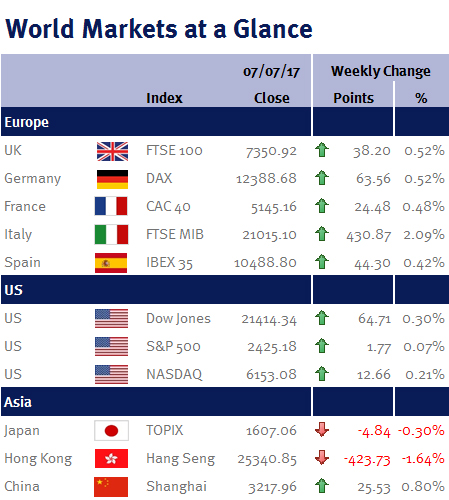Week ending 7th July 2017.
10th July 2017
The major highlight this week was the release of minutes from the last Fed monetary policy meeting held on 13-14 June 2017.
Overall, there was little in the minutes that would suggest the Fed is considering changing course on US interest rates. Consequently, it looks like there will be one more increase this year (and given recent inflation softness, a December increase is probably more likely than September).

Elsewhere US non-farm payrolls beat expectations of 178,000, rising 222,000. Perversely, the unemployment rate rose to 4.4% from 4.3%. This suggests that more Americans are re-entering the jobs market to look for jobs – especially as wage gains again disappointed, rising just 0.2% (versus expectations of a gain of 0.3%).
This highlights the Fed’s current dilemma: a strong employment report which is consistent with strong economic growth (and the need for a tighter monetary policy), but slow wage growth which is helping to contain inflation (and the need for loose/no change in monetary policy).
As for the week ahead, we will be ignoring all the political/media noise (the Repeal Bill will be presented to parliament on Monday 10 July 2017) and instead focus on what is important to the financial markets: US CPI; and UK employment data. In addition, we are expecting trading statements from a couple of UK retailers and housebuilders which should provide some insight into how the UK consumer is faring (as the consumer accounts for around 60% of the UK economy).
Ian Copelin, Investment Management Expert*
*Ian Copelin is an Investment Director at Wealth at Work Limited which is a member of the Wealth at Work group of companies
The latest market updates are brought to you by Investment Managers & Analysts at Wealth at Work Limited which is a member of the Wealth at Work group of companies.
Links to websites external to those of Wealth at Work Limited (also referred to here as 'we', 'us', 'our' 'ours') will usually contain some content that is not written by us and over which we have no authority and which we do not endorse. Any hyperlinks or references to third party websites are provided for your convenience only. Therefore please be aware that we do not accept responsibility for the content of any third party site(s) except content that is specifically attributed to us or our employees and where we are the authors of such content. Further, we accept no responsibility for any malicious codes (or their consequences) of external sites. Nor do we endorse any organisation or publication to which we link and make no representations about them.

